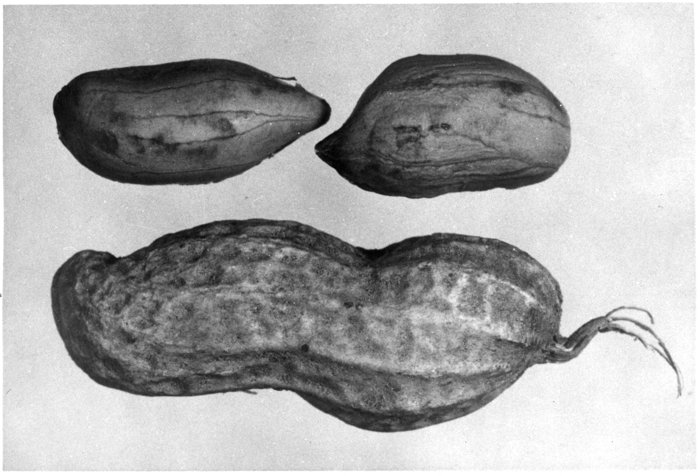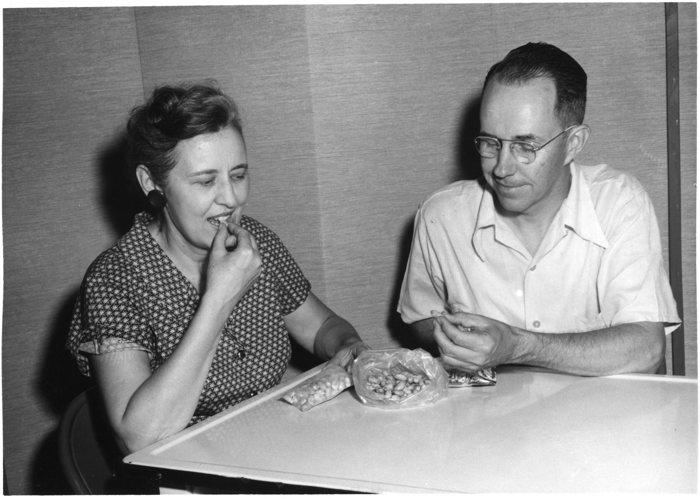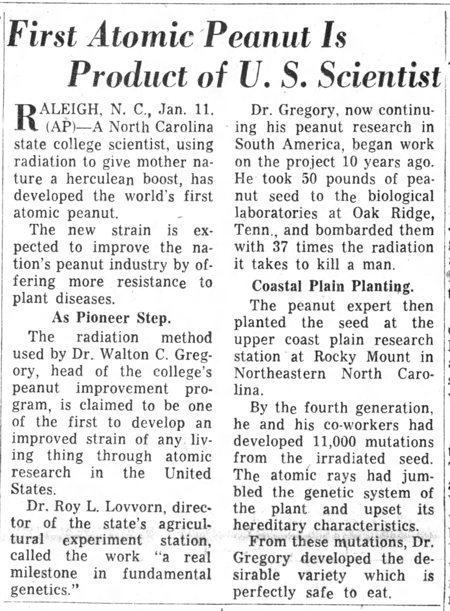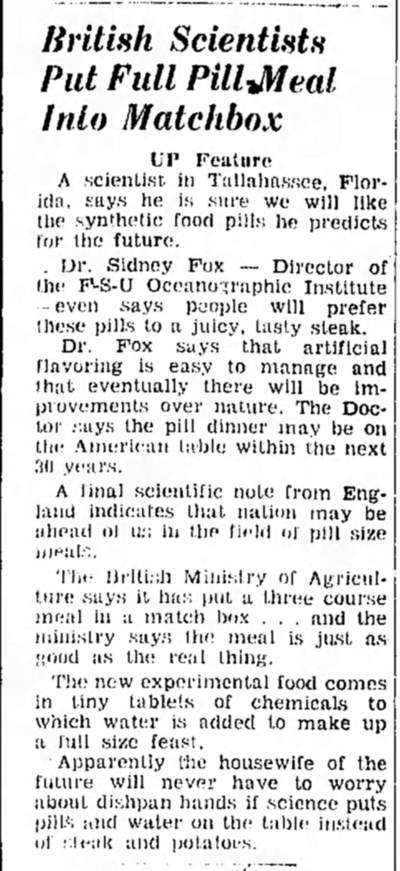Food
Atomic Peanuts
In 1959, Walter C. Gregory of North Carolina State College introduced "atomic" peanuts to the world. Despite the name, they weren't radioactive peanuts.He had exposed peanut seeds to huge amounts of radiation to create mutant strains. Then he had selected the mutant strains with the qualities (size) he liked. And in this way created jumbo-sized peanuts.
As this article at Atlas Obscura notes, what Gregory was doing was "mutation breeding," and it's the way many of the varieties of fruit and veggies we eat nowadays are created. We no longer call it "atomic" food, though it is.


Man and woman eating "atomic" peanuts

Kansas City Times - Jan 12, 1959
Posted By: Alex - Sun Aug 30, 2015 -
Comments (4)
Category: Food, Science, Atomic Power and Other Nuclear Matters, 1950s
A Meal In A Matchbox, 1956
Matchbox-sized meals. The utopian food of the future, as envisioned by British scientists of the 1950s.— Port Angeles Evening News - July 25, 1956
Matchbox meals can be kept almost indefinitely without deterioration. An example of the matchbox food could be soup, a dish of synthetic stewed steak followed by a sweet in the form of, say, apple puree. There would not be as much as you might be accustomed to see on a well-filled plate, but it would be satisfying to eat, and the flavour would be indistinguishable from the real thing. The soup will probably be in a tablet form. The stewed steak will be a packet of course granules. There will be a teaspoonful or so of white powder which will be the mashed potatoes. Another little packet of powder will contain the apple puree. The only thing to be added to the chemicals will be water.
— Keystone Wire Service, July 17, 1956


Port Angeles Evening News - July 25, 1956
Posted By: Alex - Sat Aug 29, 2015 -
Comments (5)
Category: Food, 1950s
I Hate Mayonnaise Club
Honolulu columnist Charles Memminger founded the Worldwide I Hate Mayonnaise Club in 1988. Its purpose was to spread the gospel of mayonnaise hatred. It did so by circulating quotations such as, "Mayonnaise, like hollandaise, was invented by the French to cover up the flavour of spoiled flesh, stale vegetables, rotten fish."Member's would receive an official certificate that they could frame and put on their wall.
I'm not sure if the club is active any more. Its website (nomayo.com) is dead, though you can check out an archived copy of it at archive.org.
Perhaps all the members saw the light and realized that mayonnaise is the greatest food ever.

Posted By: Alex - Sat Aug 15, 2015 -
Comments (8)
Category: Food, Mayonnaise
Cheerios Kid and Cheerios Sue
From the days when a commercial could hold an entire narrative arc in thirty or sixty seconds. Apparently the Kid and Sue were thrill-seekers who could not resist dangerous environments.
Posted By: Paul - Fri Aug 14, 2015 -
Comments (2)
Category: Anthropomorphism, Daredevils, Stuntpeople and Thrillseekers, Food, Advertising, 1960s
Follies of the Madmen #257
Housewife wielding an axe?!? Don't get your hopes up. There is no John-Waters-style carnage ahead in this commercial.
Man, that appliance is huge. Where would it fit in a modern urban kitchen? Maybe in a McMansion....
What do you think the cherry cobbler cooked adjacent to the ham and sweet potatoes is going to taste like?
Posted By: Paul - Wed Aug 12, 2015 -
Comments (7)
Category: Business, Advertising, Products, Domestic, Appliances, Food, 1940s
Follies of the Madmen #256
What a simpler world...
Posted By: Paul - Sat Aug 01, 2015 -
Comments (5)
Category: Business, Advertising, Products, Disguises, Impersonations, Mimics and Forgeries, Food, 1960s, Australia
Banana and Mayonnaise Sandwiches

There's a Facebook community dedicated to Banana and Mayonnaise Sandwiches. Also, this is apparently one of Dale Earnhardt Jr.'s favorite foods.
The Garden & Gun blog traces the popularity of peanut butter and mayo sandwiches (and presumably also of banana and mayo) back to the Great Depression:
Newspaper clippings from the national heyday of the peanut butter and mayonnaise sandwich, a period that seems to have begun in the 1930s and continued through the 1960s, provide evidence that the practice of adding mayonnaise to peanut butter could have originated as a way of transforming rough-hewn nut butters into spreadable pastes.
Posted By: Alex - Wed Jul 22, 2015 -
Comments (14)
Category: Food, Mayonnaise, Bananas
A Whole Sheep in a Can

In 1948, the Continental Can Company ran a series of magazine ads presenting "uncanny" facts about the history of canning. One of these facts was the great technological achievement from 1852 of packing an entire sheep into a huge can.
The ad didn't bother to say who exactly did this, but after a bit of googling I figured out that it was the French inventor Raymond Chevallier-Appert (1801-1892). Before Chevallier-Appert, canned food kept spoiling. He figured out that it needed to be cooked at higher temperatures. Here's the rest of the story from the Stravaganza blog:
Posted By: Alex - Fri Jul 17, 2015 -
Comments (4)
Category: Animals, Food, Technology, Nineteenth Century
The Bible Diet

The spiritual nourishment was too rich for this boy's system.
Source: Florence Morning News - Jan 9, 1926.

More in extended >>
Posted By: Alex - Mon Jul 13, 2015 -
Comments (6)
Category: Food, Religion, Books, 1920s

| Who We Are |
|---|
| Alex Boese Alex is the creator and curator of the Museum of Hoaxes. He's also the author of various weird, non-fiction, science-themed books such as Elephants on Acid and Psychedelic Apes. Paul Di Filippo Paul has been paid to put weird ideas into fictional form for over thirty years, in his career as a noted science fiction writer. He has recently begun blogging on many curious topics with three fellow writers at The Inferior 4+1. Contact Us |




